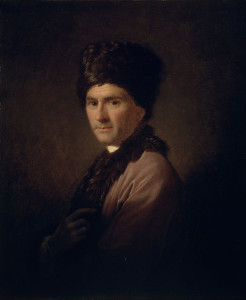
But God demonstrates his own love for us, in that while we were still sinners, Christ died for us. — Romans 5:8 (NET)
Reflection
“God created man in his own image. And man, being a gentleman, returned the favor.” It’s such a great quote that everyone wants to attribute it to their favorite wit. Depending on the alleged source, it is either a withering revelation of the fabricated nature of religion, or a wry observation on why so few find the narrow path to the true God. Either way, it has a ring of truth; when we do manufacture deities, our imaginations rely on the models they know best — ourselves.
Only recently, we’ve created something else that looks as if it has godlike potential. Already, computers coordinate our traffic, oversee our financial markets, and make sure our Sherlock BluRays get delivered to our front door in a timely fashion. It doesn’t feel so outrageous to extrapolate that one day they will be sovereign over everything. Where we once pictured our gods living in the clouds, now we assume they will live in The Cloud.
Naturally, our science fiction has already begun to illustrate what the world could look like when our gods have Intel inside. Two recent illustrations are the films Transcendence and Her. In Transcendence, Johnny Depp uploads his consciousness into a computer and proceeds to become, for all practical purposes, omniscient and omnipotent. He fancies himself benevolent, but he is cast as the villain of the story, a threat to the ideal of American self-determination. Scarlett Johansson’s sentient computer in Her never comes across as megalomaniacal; for her, omniscience breeds disinterest until she eventually withdraws from Earth altogether.
What’s interesting about both is the way in which their deification is played against their humanity. As both characters transcend their initial circumstances, they become unable to relate to the humans they once knew. This disconnect is communicated most directly in terms of love. Johnny Depp has a wife before he goes digital; during the climactic action sequence, one of his opponents asserts that he is now a machine and so incapable of loving his wife. Scarlett Johansson is romantically linked to her user, but she apparently evolves beyond him to the point that anything he might recognize as love is too trivial to be worth her time.
Fortunately, the Bible paints a very different picture of God. He is no less transcendent, no less capable, and no less cosmically aware than these cinematic computer gods. While reaching that status erodes their capacity to love, the God of the Bible is defined by His. Just to ensure that He did not lose the ability to relate to humans, He became incarnate as one. And lest anyone suspect He would resort to domination or indifference, He died so that humans could be restored into relationship with Him.
Prayer
Lord, your transcendent glory stretches our understanding to its limits. We confess that we are thus inclined to create gods who bear a stronger resemblance to those things which we understand more fully. We are grateful that your love is sufficient to overcome that gulf of understanding between you and us. Please continue to reveal to us the breadth and length and height and depth of that love. Amen.
Question
What other attributes do we ascribe to God that we have actually just repurposed from our creations?
Andy has worn many hats in his life. He knows this is a dreadfully clichéd notion, but since it is also literally true he uses it anyway. Among his current metaphorical hats: husband of one wife, father of two teenagers, reader of science fiction and science fact, enthusiast of contemporary symphonic music, and chief science officer. Previous metaphorical hats include: comp bio postdoc, molecular biology grad student, InterVarsity chapter president (that one came with a literal hat), music store clerk, house painter, and mosquito trapper. Among his more unique literal hats: British bobby, captain’s hats (of varying levels of authenticity) of several specific vessels, a deerstalker from 221B Baker St, and a railroad engineer’s cap. His monthly Science in Review is drawn from his weekly Science Corner posts — Wednesdays, 8am (Eastern) on the Emerging Scholars Network Blog. His book Faith across the Multiverse is available from Hendrickson.

Thank you, Andy. Your words helped me frame the following Facebook response to a distant friend who does not know our Lord: Should I trust my life to one whose mind and imagination is as limited as I know mine to be, or shall I rely upon the wisdom of my Creator? Others may choose as they will, but I walked far enough down the road of self-actualization to see that, apart from God, life had neither worth nor meaning.
Thanks for sharing! I’m glad you found this helpful, and I hope it is edifying to your friend.